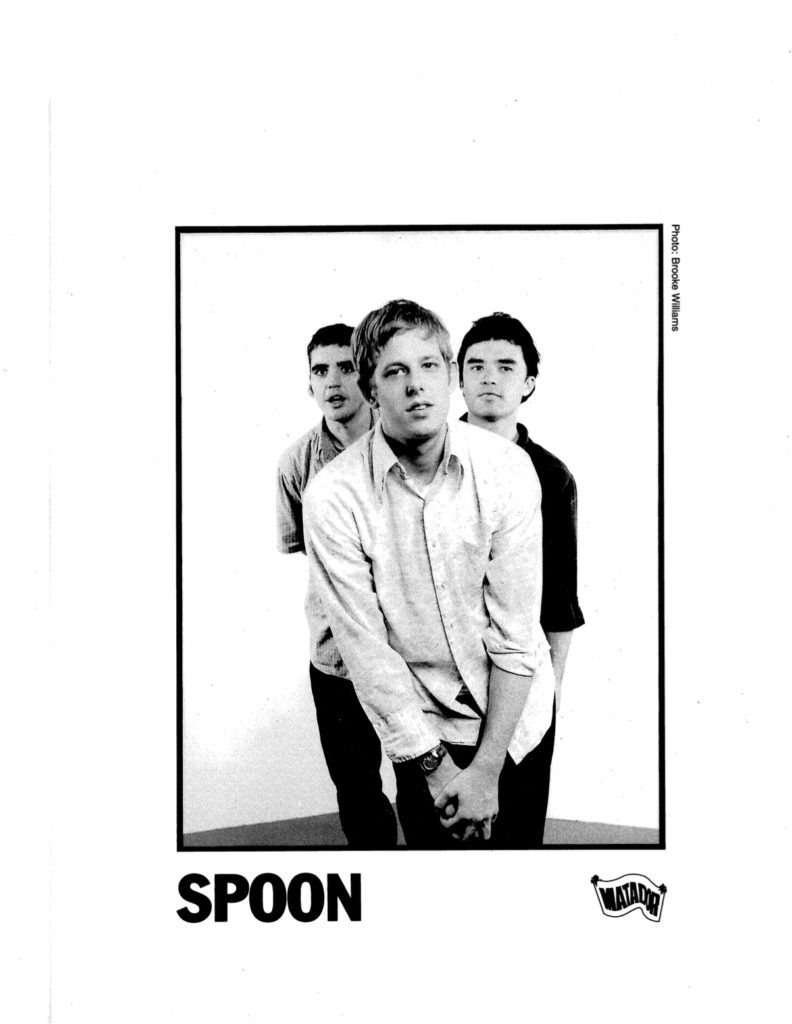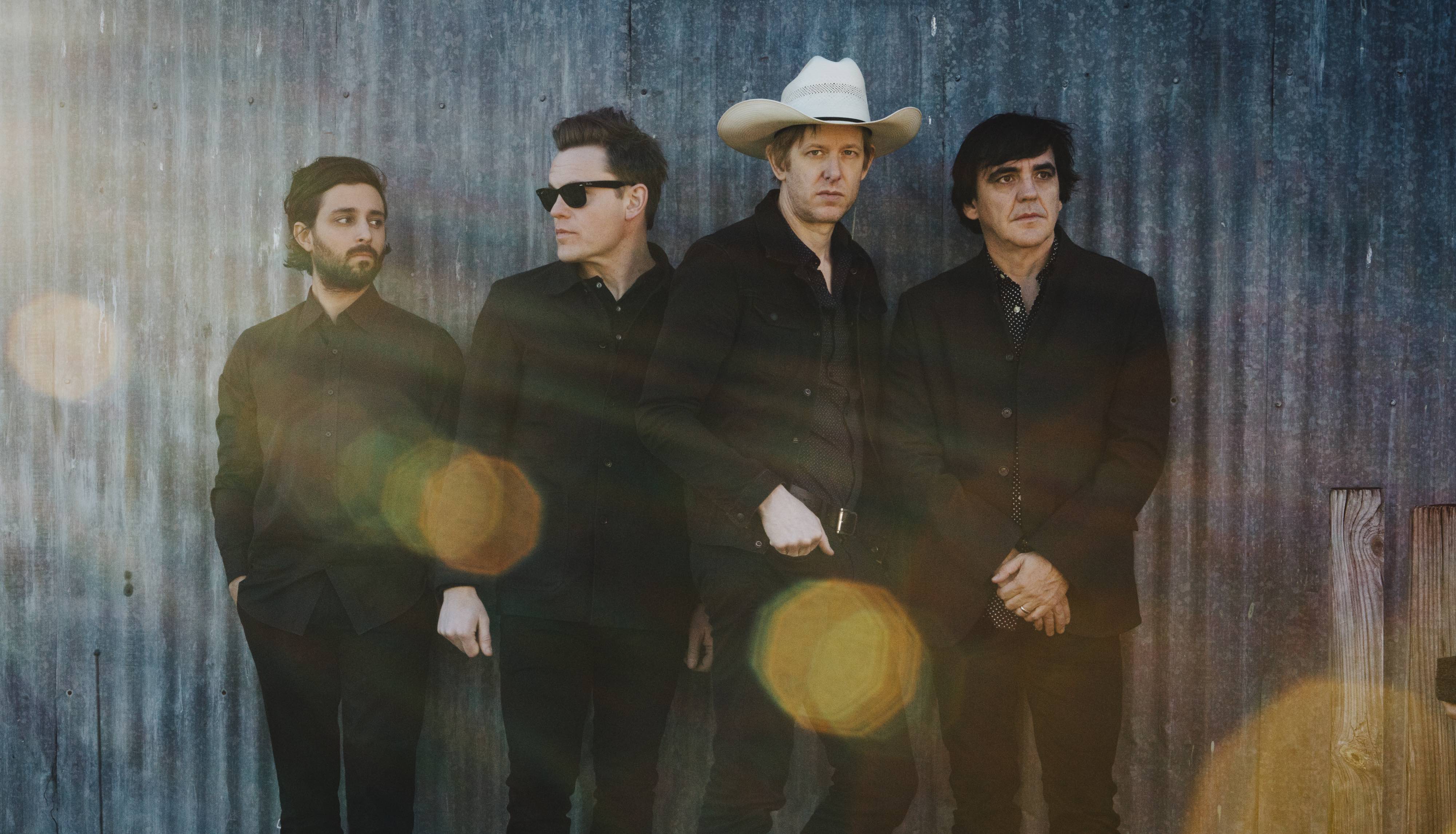The last time Spoon had a release on Matador Records, it was the first day of Bill Clinton’s second term. The label was gearing up to push Brighten the Corners and I Can Hear the Heart Beating as One, and the top movie in the nation was Beverly Hills Ninja. Britt Daniel, then twenty-five, was actively being compared to Black Francis of the recently broken-up Pixies.
The release at hand was the Soft Effects EP, which was something of a companion to the band’s debut full-length Telephono—also on Matador. Despite its themes of dismemberment and paranoia—not to mention its carefree use of the word “motherfucker”—that LP had been the source of a bidding war from labels, who were smitten with the rough and ragged collection of songs recorded on a tight budget in a garage.
“‘Garage’ might be a grandiose way of putting it,” laughs Daniel, talking on the phone from South by Southwest in Austin, where he and his bandmates—Jim Eno, Rob Pope, and Alex Fischel—are hometown heroes. The quartet’s presence at the 2017 installment of the festival is in support of Spoon’s ninth LP, Hot Thoughts—their latest in an absolutely baffling run of consistently great albums dating back to 1998’s A Series of Sneaks, and their prodigal return to Matador twenty years after they first split.
“I kind of feel now like I did back in ’95 when we were being courted by all these major labels,” says Daniel. “I thought, ‘If we could have success with any label I’d rather have success with Matador, so let’s give it a shot.’ Just that logo and what the company has done in terms of putting out records is pretty amazing.”
The label might be the same, but a lot has changed for the band since the Telephono/Soft Effects days—and not just regarding the nation’s relative taste for slapstick ninja movies and presidential scandals. For starters, back in 1994, Spoon was outright rejected from SXSW (they played an unofficial party instead, where it just so happens that they were discovered by Matador’s Gerard Cosloy, who soon signed them). This year, on the other hand, they hosted a three-day showcase.

Daniel is now forty-five, still has dirty blond hair (cut sharp), and answers questions with a cool, calm assurance. He thinks carefully before he speaks, has a subtle Texas accent, and has an even more subtle sense of humor. (His Facebook page, for instance, lists a contact number that puts you in touch with a plasma donation center in Van Nuys, California.) Another way of putting it: for one of the most legitimate rock stars alive, he’s very well put together. And yet, he’s mysterious all the same—especially when you try to figure him out via his music.
“I go with the vibe that a songwriter can write from many perspectives,” Daniel explains, “and that not every song has to be about me or from me. I think every writer should feel entitled to do that.”
Case in point: lead single and album title track “Hot Thoughts,” which, ostensibly, is one of the most straightforwardly sexy songs that Daniel has ever written (“I tell it to you slow when I want ya to know,” he croons), but is in fact layered with more sinister undertones. Specifically, the line “Your teeth shinin’ so white / Light up this side street in Shibuya tonight” takes on a whole new meaning when you learn the full context of the creepy scene that inspired it.
“My girlfriend was in Shibuya [in Tokyo],” as Daniel tells it, “and some guy came up to her on the street, late at night, and told her that her teeth looked beautiful and shiny. I thought that was a pretty…original way to hit on my girlfriend.”
This isn’t a unique example. The band’s discography is littered with songs that sound smooth and seductive when taken at face value—you’ll catch Spoon songs in commercials and soundtracks with some regularity—but carry with them manic, unpredictable chord progressions and lyrics about obscure medical conditions and “parking lot town[s]”; there are minors where there should be majors, insecurities where there should be bravado. As if to illustrate this point, both sides of Hot Thoughts, the band’s most pop-friendly release since 2005’s Gimme Fiction, are capped with semi-instrumental abstractions. Just to keep you on your toes in case you get too comfortable.
But there’s something else about the Tokyo story that is quintessentially Spoon. Like many past classics from the band, “Hot Thoughts” places you in an exact location: “Whether [it’s] a boot shop or outside a record store or on the street in Shibuya,” Daniel explains, “I want to get some some specific language that places it somewhere. Sometimes you can just sing in pronouns and that’s easy—but it doesn’t really stick with you, you know?”
“I certainly don’t think that the term [indie rock] is dead. Maybe it should be dead.”
The boot shop that he’s talking about is Dorian’s in Portland (referenced in “Black Like Me” from 2007’s Ga Ga Ga Ga Ga) and the record store is Sound Exchange in Austin (referenced in “Anything You Want” from 2001’s Girls Can Tell). The full effect of this narrative technique—jumping around from character to character, place to place—makes listening to a Spoon album somewhat akin to the experience of watching a film from another beloved Austin figure: Richard Linklater’s Slacker. You can feel the textures and hear the conversations, but you’ll never really get handed the full scope of what’s going on. That’s ultimately on you. And like Linklater, Daniel has also in recent years suddenly found himself in the position of being an elder statesman of a scene that he originally helped to build—just don’t call it “indie.”
“I never really understood what ‘indie rock’ meant,” he says. “As a term of commerce I understand it: a band on an independent label. But when you’re talking about a genre, I don’t think there’s any consensus. To me, if I had to guess, it means a band that doesn’t try very hard. Or kind of wants to play, like, cool rules. ‘Junior Leagues Rock.’”
As you can imagine, then, Daniel doesn’t think there’s any credence to the “indie is dead” argument, either: “I don’t know that it’s dead when it seems like every band that’s got guitars in it that isn’t Maroon 5 is pretty much looked at as indie rock at this point,” he says. “I mean, what are the major rock bands? I don’t know. I certainly don’t think that the term is dead. Maybe it should be dead.”
_____
In the immediate aftermath of Telephono, things did not go well for Spoon. The album sold as many copies in its initial run as the amount of dollars that were spent on its production (3,000), and the band subsequently went through a rotating cast of bass players as Daniel worked with Eno—the backbone of the group from the very beginning—to carry on as a shaky three-piece, picking up opening spots on tours that they didn’t want to be on in the first place.
Their relationship with Matador ended soon after Soft Effects, which led to the infamous Elektra Records/Series of Sneaks scandal that almost sank the band. (Long story short: a three-album deal isn’t actually a three-album deal if the label changes their mind later.) (Long story even shorter: listen to the band’s single written about the whole affair, “The Agony of Laffitte”/“Laffitte Don’t Fail Me Now.”) By 1999, Daniel was dejected and uninspired. He moved to New York and took a job as an assistant at a bank. He wore a suit.
But that wasn’t the end of the story, of course. Spoon regrouped and found their commercial footing on Merge Records, and these days, their name is synonymous with consistency and quality and style. So you’ll have to forgive Daniel if he isn’t worried about the next generation of bands surviving the death of indie.
“When you’re starting out and people don’t know about you, you’re not gonna make money,” he laughs. “But [musicians] find it worthwhile to keep doing it because music unites people and reaches your emotions directly. It’s an art that you can do by yourself and you don’t have to count on the funding for it.” He pauses here. The interview’s almost up, and Spoon have a showcase to headline.
“It’s a beautiful thing.” FL
This article appears in FLOOD 6. You can download or purchase the magazine here.









